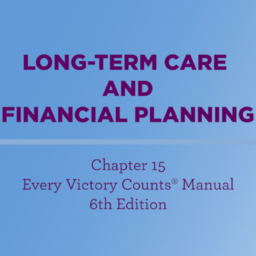We recently sat down with a good friend of the Foundation, Bud Rockhill, to talk about his experience caring for his mom who had Parkinson’s. He had so many great tips and insights into nearly every aspect of her care that we asked if we could share them with our community.
Please note that these were Bud’s experiences, and this article is not intended to give financial or legal advice. Rather, it is to offer you a checklist for some of the different elements of care that you may want to understand prior to or when you become someone’s primary care partner.
Here are some of his considerations for planning and managing the care on behalf of an aging parent:
#1 – While your parents are healthy, get the basics in place
Power of Attorney – You should get both a financial and medical power of attorney. Make sure someone is authorized to make decisions on behalf of your parents beside them. If you don’t have this, it’s going to make it extremely difficult to deal with hospitals, doctors, banks or anyone else who could potentially be involved in their care.
Advanced Directive – This may not seem like a family conversation, but it needs to be. It’s important to be clear on what your parents want regarding resuscitation and life support if something bad happens, and you want to have the documentation in place for hospitals and doctors. Some states require a specific form; so, check your state requirements. All you have to do is type your state and advance directive into Google and you will get the state-specific information you need. Read this for more information on Advance Directives.
Will – While this seems obvious to some, I’ve met many people over the years who don’t have a will in place. A will makes it much easier if there are multiple family members or an estate with value. Equally as important, if there isn’t one, it can delay everything after the person dies, which makes it more difficult to say good-bye and move on.
#2 – Make sure they’re covered
For people over 65, Medicare becomes the primary insurance provider. However, Medicare doesn’t cover everything so many people get Medicare Supplemental Insurance, which is available through a number of providers. From each provider, there are a number of different plan types. Many people may be inclined to choose the cheapest plan; however, be sure to read the fine print because if extra medical care is required, it’s easy to not have the right coverage.
For example, with one provider, they have a Basic Plan which is relatively affordable; however, it doesn’t provide extensive coverage for longer rehabilitation center stays. So, depending on their situation, it’s probably better to have the more expensive plan, which provides coverage for the part of rehab that Medicare doesn’t cover. For many people, the $40 per month difference in premium costs seem high – until you realize (or experience) the daily cost for care that’s not covered. Please note that plan availability varies by carrier and by state of residence.
There is also prescription supplemental insurance that has a mandatory enrollment date in early December each year. Many plans have an online calculator that lets you plug in the different types of medication and doses (per month) that your parents use, and then it shows you your estimated annual costs. By using a tool like this, you can compare plans. In our case, we switched from one insurance company to another and were able to realize major annual savings.
#3 – Downsize or relocate before it’s time
If your parent(s) reaches the point when it’s absolutely necessary to make a move, it’s going to be a lot more difficult on them (and you). Nobody likes to move, and it’s much worse in a stressful situation brought on by a medical emergency. Do it before it’s urgent.
When it’s time to move, try to find a place with all levels of care including independent living, assisted living and skilled nursing. This avoids the problem of multiple moves into multiple different places, and once you’re established, there will most likely be availability when you need access to the next level of care.
#4 – Get the support you need to give them the care they deserve
There is a profession called “Aging Life Care Professional”, which is kind of like a general contractor for senior citizen medical care. The right Care Professional can save you hours of work and many dollars by referring you to trustworthy and quality care providers. The Care Professional is paid an hourly rate, but this service quickly pays for itself in terms of your time saved and care received. For example, when looking for a home health care agency, you can interview agencies or try to find referrals, or a Care Professional can provide you with recommendations.
The Care Professional also can “validate” you when you’re talking to home health care agencies or nursing homes. When you call, you can say, “I was referred by Susie Smith” or “I’m working with Susie Smith.” This lends you some credibility (if you have the right Care Professional) because you’re working with someone who already brings them clients, and it demonstrates that you’re already willing to pay for services.
The Aging Lifecare Association is a national group of professionals with a website that can help you begin the search for a local resource. See: https://www.aginglifecare.org/.
#5 – Manage their medical records
In order to manage a parent’s medical records, you’ll need the Power of Attorney mentioned above to do this; however, to make managing them even easier, it helps if you have copies of hospital discharge reports, doctor visit summaries, test results, etc. Because of privacy concerns and outdated technology, lots of patient records and information are not transmitted electronically. Some still use faxes! So, if you can get all of the info, scan it and have it available to speed up the process of getting your parent the care they need.
If your parent(s) are comfortable sharing, and especially if they don’t have a spouse, it can be very helpful to have the account information and online log-in for any financial resources or insurance they have. This is even more important after they’re passed because it will be necessary to cancel any insurance policies. You should have the name and phone number of the insurance company for any policies, plus the account number, username and password. This includes:
- Social Security – There’s an online portal for this and, depending on their financial situation and care needs, you will need the annual Social Security statement every year
- Any supplemental health insurance or prescription insurance
- While you’re gathering this info, and especially if there’s no spouse, you may also want to get the same for phone service, utilities, etc.
It is also very helpful for everyone if you can keep records of doctor visits or observations about your parents’ health when there is a decline. People of a Certain Age are either reluctant to talk about their medical stuff or may not remember, especially in a stressful medical situation or when being “overwhelmed” in a doctor’s office. If you can walk in with a summary of what’s going on, when the symptoms started or what happened, plus a list of questions that you and/or your parents have, it can save a lot of time and let the doctor focus on answers. Some doctors also offer patients access to a patient portal where you can include notes and questions before your appointment so they can prepare ahead of time.
#6 – Know your home health care resources
In some cases where a parent is not well enough to live independently but does not need to be in the hospital or has a chronic condition, they may need home health care. This could range from 1-2 hours per day to help with some basics to around the clock, or somewhere in between.
This can become very expensive, with rates over $20 per hour when working through an agency. The good thing about an agency is that they do all of the screening, hiring, payroll and scheduling; however, depending on how much home help is needed, the cost can quickly escalate to over $20,000 per year for minimal home care, and much more for a higher level of care.
Some independent senior residences have an affiliation with a specific home health care agency, which hopefully means the search has already been completed.
If that’s not available to you, you can find a home health care agency by contacting friends or “Mom networks” in the area for referrals. Your Care Professional will undoubtedly have one or two agencies to recommend. Also see APlaceForMoms.com.
Even though you’re working with an agency, it still requires a lot of work on your part (unless you have both parents and only one parent needs care, and the other parent is managing the agency). You need to confirm schedules, report any no shows, keep them advised on your parent’s medical condition and make sure payment is being handled.
Being a home health aide is very challenging, and like many occupations, is not the highest paying job in the country. Therefore, levels of care and quality can vary greatly, even from the same agency. Make sure that you communicate with your contact person at the agency and let them know if there are aides who are doing a great job (usually they will only hear complaints so they really appreciate positive feedback) and also let them know if there are aides who don’t seem to be a good personality fit or who aren’t as effective (less attentive, not timely, etc).
#7 – Investigate nursing homes early and thoroughly
Some people with Parkinson’s live independently their whole lives until it’s over, and that’s a wonderful thing. Others are mostly self-sufficient but need occasional help or access to home health care and medical care occasionally. That’s what Assisted Living can provide.
The highest degree of care comes through Skilled Nursing (e.g. Nursing Home or a Skilled Nursing Facility (SNF)). This provides round the clock care through a combination of doctors, physical and occupational therapists, nurses and aides.
There is a very wide range of quality and care levels within the category of Nursing Homes, which means a lot of due diligence is required. Referrals are the best way to start, but if you don’t know anyone who has needed this level of care in the area, the Geriatric Care Manager can help you quickly narrow a list of 50-100 possible choices down to 5-10.
Then it’s kind of like applying to college. You call and talk with the Admissions’ Offices to learn the basics about care levels, staff/patient ratios, costs and availability of Medicaid beds (if financial circumstances require). Based on the information and the tone of the conversation, you may choose to move on to the on-site visit part of the evaluation. You can schedule an appointment and get the “standard” tour, which is very helpful to make sure you see the entire facility and get all of the information. I also recommend just dropping in without an appointment before making a final decision, so you make sure you’re seeing it “real” and not “staged”. When doing this, it can be very helpful to speak with visiting family members of others in the nursing home and ask for their opinion; they will understand why you’re asking, and probably be more candid.
Hopefully, some of the experienced-based ideas in this post can help save you time, money and frustration as you navigate the care system, and let you do what you can to put in place the best possible care plan and resources for your parent(s).
Get the every victory counts manual for care partners
Do you have the Every Victory Counts Manual for Care Partners! Released in 2021, this resource is available at no cost in print and digital versions. To learn more and request your copy, click here.






